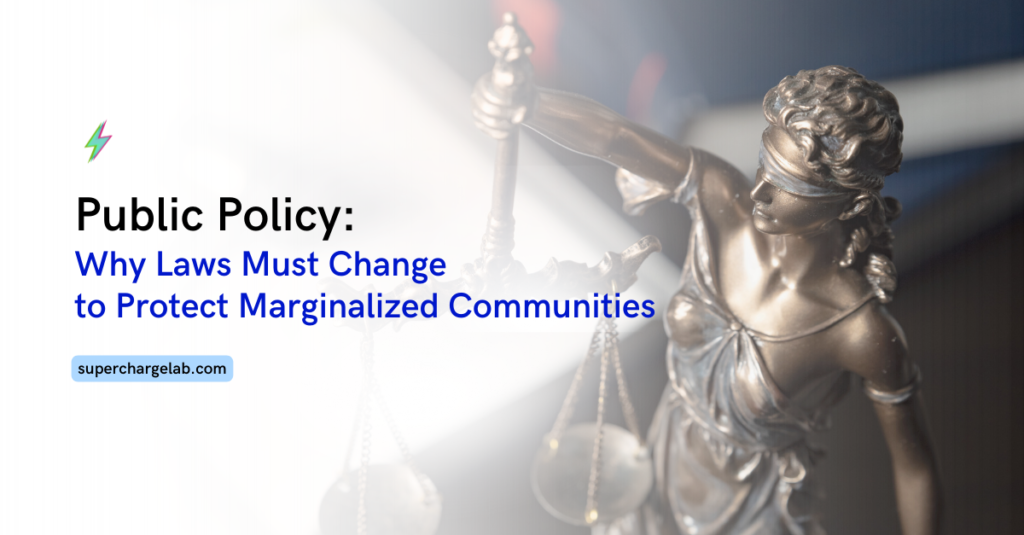
Have you ever noticed how some laws, even with good intentions, can backfire? This is especially true when it comes to protecting marginalized communities – those groups who’ve historically been left out or discriminated against. Existing legislation often misses the mark, creating loopholes that continue to marginalize these folks. It’s time to take a hard look at our public policies and make changes that truly level the playing field.
1. Equality and Non-Discrimination
The foundation of protecting any marginalized group lies in two simple words: equality and non-discrimination. These rights mean everyone, no matter their background, should have the same opportunities and be treated with the same respect. Sounds simple, right? But it’s not always the reality. We need strong laws that put these rights into action, making sure everyone gets a fair shot at jobs, education, housing, and everything else life throws their
2. Protecting Cultural Identity
While non-discrimination is a crucial starting point, true inclusion goes beyond mere tolerance. It involves actively protecting and celebrating the unique cultural identities of marginalized communities. This means safeguarding the right to practice one’s religion freely, to speak one’s native language without fear of reprisal, and to express cultural traditions without discrimination. In practice, this might look like recognizing religious holidays in the workplace, providing language assistance services in government offices, or supporting cultural events and festivals. It also means ensuring that educational curricula are inclusive and represent diverse perspectives.
But protecting cultural identity isn’t just about individual rights; it’s about empowering communities. Policymakers must actively engage with and consult minority communities when creating laws and policies that affect them. This ensures that their unique needs and perspectives are taken into account, leading to more effective and equitable outcomes. After all, true inclusion means valuing and incorporating their diverse contributions into the fabric of our communities.
3. Combating Hate Speech and Violence
Hate crimes and discriminatory violence are a devastating reality for many marginalized communities. These acts aren’t just isolated incidents; they’re rooted in deep-seated prejudices and systemic inequalities. To effectively combat this issue, a two-pronged approach is necessary: strong legislation and strong education.
On the legal front, we need clear laws that explicitly criminalize hate crimes and bias-motivated offenses. These laws must include strict penalties to deter perpetrators and send a clear message that hate has no place in our society. Additionally, it’s important to recognize hate motives as aggravating factors in sentencing, ensuring that the severity of the crime is fully reflected in the punishment. But laws alone aren’t enough. We must also invest in education and awareness campaigns that challenge harmful stereotypes, promote empathy and understanding, and celebrate diversity.
4. Free Speech and the Fight Against Hate
Freedom of expression is a cornerstone of any democratic society. However, the right to free speech comes with responsibility. We must draw a clear line between protected speech and harmful hate speech that incites violence or discrimination against marginalized groups. Laws should prohibit such speech while still upholding the principles of free expression. This requires a nuanced approach that balances the need for open dialogue with the protection of vulnerable communities.
Education also plays a crucial role in combating hate speech. By teaching critical thinking skills and promoting media literacy, we can empower individuals to recognize and challenge harmful narratives. Additionally, fostering a culture of dialogue and understanding can help prevent hate speech from taking root in the first place. This involves encouraging respectful conversations, even when opinions differ, and creating spaces where diverse voices can be heard and valued.
5 Conclusion
To achieve true equality and inclusion for marginalized communities, we must continuously adapt our laws and policies to reflect the evolving challenges they face. This involves actively promoting their participation and contributions to society. When we tackle issues like cultural identity, hate crimes, and hate speech head-on, we pave the way for a fairer and more inclusive society where everyone has a chance to succeed and grow.
What specific laws or policies would you propose to further support marginalized communities?